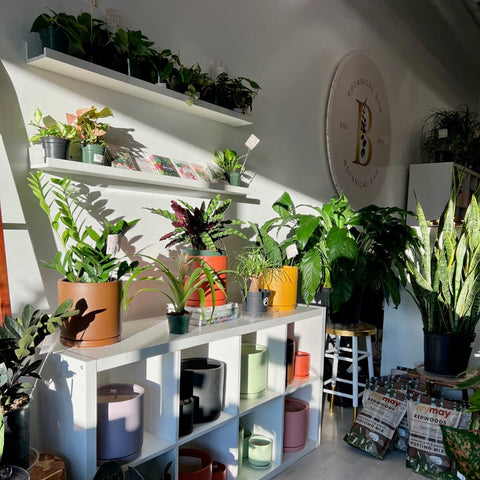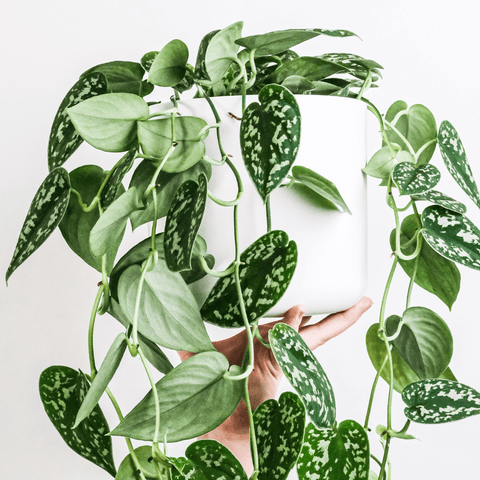What exactly are the benefits of plant parenting? In this article, we'll explore why plant parenting can benefit your health and well-being and how you can reap the help of this wonderful hobby. We'll discuss the positive effects on your mental health, air quality, and productivity and give you tips on how to get started with plant parenting so you can enjoy all the beautiful benefits of caring for houseplants.
What Are the Benefits of Plant Parenting?
Plants bring joy, beauty, and a connection to the natural world into our homes. Plant parenting is the practice of taking responsibility for the well-being of a houseplant or plants and caring for them as one would for a pet or a child. Plant care benefits plants and can positively affect the health and well-being of those who care for them too.
Studies suggest that caring for plants can improve physical and mental health. Plant parents show improved levels of concentration, memory, and problem-solving, as well as reduced levels of stress, anxiety, and depression. Additionally, spending time with plants can boost a person’s mood, and the presence of houseplants has been linked to increased productivity, creativity, and relaxation. Plants positively affect the mind and body, and some mental health professionals are now prescribing plant care as part of their therapy.
Plant parenting can also offer social benefits, like connection and companionship. Caring for a houseplant can be a self-care ritual that brings comfort and joy and provides a sense of purpose. Additionally, talking to plants, singing, and watching them grow have reduced loneliness and offered emotional support.
Lastly, plant parenting is beneficial for the environment. Indoor plants clean the air by absorbing pollutants like formaldehyde, benzene, and carbon dioxide and releasing oxygen. They also reduce carbon emissions and create a more energy-efficient environment, as they can reduce temperatures by 4-6 degrees Celsius. Not only do plants help maintain indoor air quality, but they can also reduce noise, provide protection against dust and allergens, and reduce levels of electromagnetic radiation.
Plant parenting can be a rewarding and enjoyable experience that can bring a sense of joy and connection. It may also provide numerous health and environmental benefits, which make it an ideal way to get involved in activities that support our well-being.
Mood and Stress Levels
For those looking to improve their well-being, caring for houseplants can be a great way to relax and reduce stress. Studies have shown that interacting with plants positively impacts mood and stress levels. Plant care has been found to lower cortisol levels, the hormone related to stress and anxiety, by up to 40%. Additionally, caring for houseplants can provide a feeling of accomplishment and reduce feelings of depression and fatigue. Taking the time to nurture and care for plants can also make people more mindful, grateful, and connected with their environment. Additionally, studies have suggested that caring for houseplants can give people a sense of purpose and satisfaction.
Air Quality
Regarding air quality, plants play an essential role in improving their environment. Houseplants act as natural air filters, helping to reduce airborne contaminants in indoor spaces. Research has even shown that plants can reduce CO2, dust, and formaldehyde from the air. Plant care involves keeping plants healthy and happy, providing adequate light and water, and preventing overwatering. Additionally, regular pruning and some research can help identify which plants will best purify the air in your home. Plants can be a powerful tool for improving air quality in your home, so it’s essential to put in the effort to keep your plants healthy and thriving.
How To Start Plant Parenting
Are you interested in taking on the joyful job of plant parenting? If so, you’ve come to the right place. Plant parenting is not only a rewarding hobby but can also bring countless mental health benefits. Before you dive into your new project, let’s review the basics of plant parenting.
The first step of successful plant parenting is to select the right houseplants for your home. Consider factors such as the amount of sunlight that enters your home, the humidity levels, and the temperature. You may even purchase plants requiring minimal care as you’re a beginner. When shopping for plants, check the plant labels to ensure the plant fits your conditions.
Once you’ve chosen the right plants for your home, you’ll need to know how to care for them properly. Plant care is an essential part of plant parenting. Start by understanding the needs of each of your plants, such as watering, sunlight, and fertilizer requirements. Typically, watering once a week is enough, but if your plants dry out quickly, you may need to water them more frequently. You should also be mindful of how much sunlight your plants get – too much sunlight can lead to leaf burn.
You should also be mindful of how much fertilizer to use, as too much can lead to fertilizer burn and damage to your plants. While some plants may require occasional misting, others may need additional humidity, such as grouping plants together or using a humidifier.
Finally, plant parenting is about more than just taking care of your plants – it’s also about connecting with them. Be it a simple “hello” or a detailed story, talk to your plants. While it may sound crazy, it has been proven to affect your mental and physical health positively.
Plant parenting is an enriching hobby and an incredible source of joy. With these essential tips on how to start plant parenting, you’ll be on your way to becoming a successful plant parent in no time.





Comments (0)
There are no comments for this article. Be the first one to leave a message!